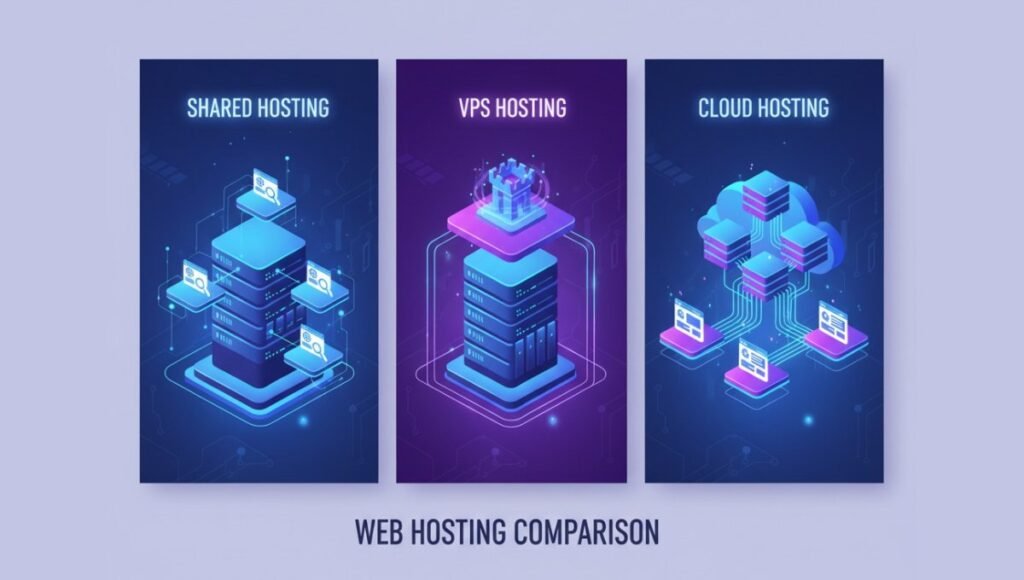When starting a website or scaling your online business, choosing the right hosting plan is one of the most important decisions. With so many options like Shared Hosting, VPS Hosting, and Cloud Hosting, it can feel overwhelming. Don’t worry — in this guide, we’ll break it down in simple terms so you can choose the hosting that fits your needs and budget.
What is Shared Hosting?
Shared hosting is like renting an apartment with roommates.
- Your website shares server resources (CPU, memory, bandwidth) with many other websites.
- It’s the most affordable option and ideal for beginners or small websites.
Pros:
✅ Low cost (budget-friendly)
✅ Easy to set up (beginner-friendly)
✅ Often comes with free domain & email
Cons:
❌ Limited resources (slow if traffic spikes)
❌ Less control over server settings
❌ Security risks since multiple sites share the same server
Best for: Personal blogs, small business websites, portfolio sites.
What is VPS Hosting?
VPS (Virtual Private Server) hosting is like renting your own private condo.
- You still share a physical server, but you get dedicated resources allocated only to your website.
- This gives you more speed, control, and flexibility compared to shared hosting.
Pros:
✅ Dedicated resources (better speed & stability)
✅ Greater customization and control
✅ Scales better as traffic grows
Cons:
❌ Higher cost than shared hosting
❌ Requires some technical knowledge for setup/management
Best for: Growing websites, medium-sized businesses, ecommerce stores.
What is Cloud Hosting?
Cloud hosting is like having multiple apartments in different buildings — and you can use resources from any of them whenever you need.
- Your website is hosted across multiple servers in the cloud, ensuring high uptime and flexibility.
- If one server goes down, another instantly takes over.
Pros:
✅ Super scalable (pay for what you use)
✅ High uptime and reliability
✅ Handles traffic spikes with ease
✅ Great for global reach
Cons:
❌ Can be more expensive over time
❌ Pricing may vary depending on usage
❌ Requires some technical understanding
Best for: Large businesses, high-traffic websites, SaaS, global applications.
Quick Comparison Table
| Feature | Shared Hosting | VPS Hosting | Cloud Hosting |
|---|---|---|---|
| Cost | Low 💲 | Medium 💲💲 | Flexible 💲-💲💲💲 |
| Performance | Basic ⚡ | Better ⚡⚡ | Excellent ⚡⚡⚡ |
| Scalability | Limited 📉 | Moderate 📈 | Very High 📈📈📈 |
| Best For | Beginners/blogs 📝 | Growing sites 🏪 | Enterprises 🌍 |
So, Which One Should You Choose?
- If you’re just starting out → go with Shared Hosting.
- If your website is growing & needs more power → choose VPS Hosting.
- If you expect high traffic, global visitors, or need maximum uptime → invest in Cloud Hosting.
👉 Pro Tip: Start with shared hosting and upgrade later as your website grows. Many hosting providers make migration seamless.
Final Thoughts
Your hosting choice can make or break your website’s performance. Think about your budget, technical skills, and growth plans before deciding.
At DigitalAdvisorAI.com, we recommend starting small but planning big — choose a host that allows easy upgrades so you can scale without headaches.
FAQ
Shared hosting means your website shares server resources with many others. VPS hosting gives you dedicated resources within a shared server. Cloud hosting uses multiple servers for scalability and uptime.
For beginners, Shared Hosting is usually best because it’s affordable, simple to set up, and comes with beginner-friendly tools.
Yes, VPS hosting is worth it if your website is growing and needs more power, speed, and stability than shared hosting can offer.
Cloud hosting is ideal for businesses expecting high traffic, global reach, or needing maximum uptime. It’s scalable and reliable, but often more expensive.
Absolutely. Most hosting providers allow seamless upgrades, so you can start with shared hosting and move to VPS or cloud as your website grows.



